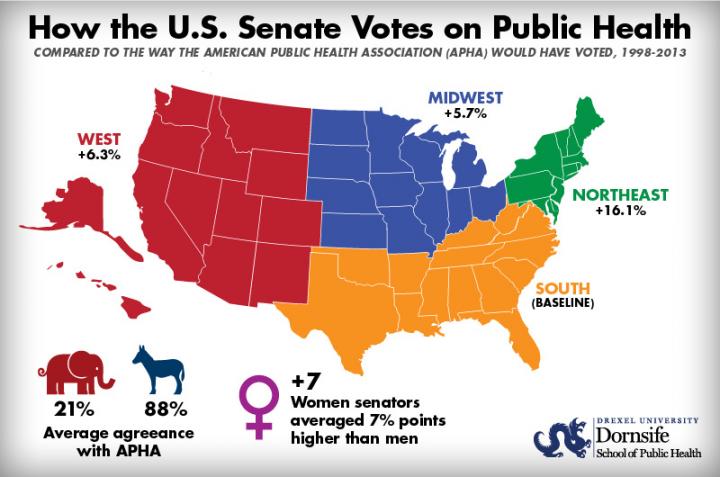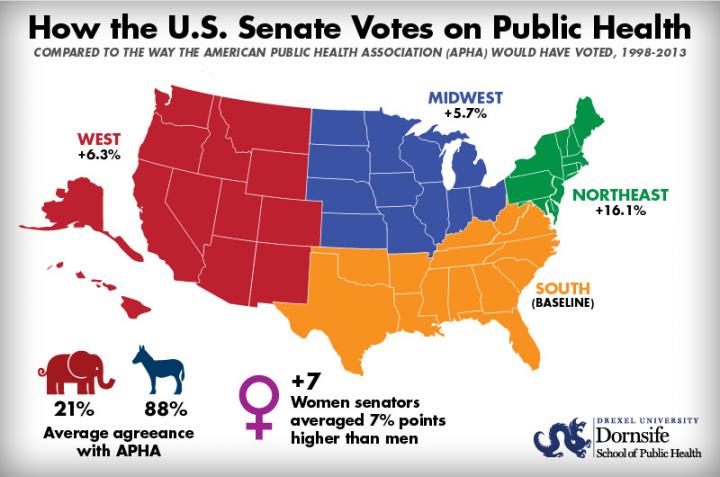
Credit: Courtesy of Drexel University's Dornsife School of Public Health
Democrat senators are roughly four times as likely to use their vote to positively affect public health policies than their Republican colleagues, according to a Drexel University study that confirms political polarization around the issue.
Looking at numbers dating from 1998 through 2013, Jonathan Purtle, DrPH, an assistant professor in Drexel's Dornsife School of Public Health, found that the average split between support is a whopping 67 percentage points when it comes to legislation endorsed by the American Public Health Association (APHA), a 140-year-old professional organization dedicated to advocating for improved public health in the United States. Democrats voted in line with APHA's recommendations 88.3 percent of the time, on average, while Republicans' average was just 21.3 percent.
"The findings are concerning — but not surprising," Purtle said of his study, published in SSM-Population Health. "They empirically show that the political polarization of public health policy is indeed as bad as it anecdotally seems — and has been bad for at least 15 years."
To measure the differences in public health support, Purtle, along with fellow Drexel faculty member Neal Goldstein, PhD, and a pair of (now former) graduate students — Eli Edson and Annamarie Hand — examined APHA's Annual Congressional Record for each year during the study period. The Record identifies legislation introduced into Congress that could have major effects — either good or bad — on public health, establishes how the Association would vote, then records whether each senator voted that way.
The highest difference between Democrats and Republicans occurred in 2011, when Democrats voted the way APHA would have 97.5 percent of the time, while Republicans voted that way just 6.1 percent of the time. That difference amounted to 91.4 percentage points. The narrowest difference came in 2008, when the difference was 42.9 percentage points.
Purtle and his team did not just look at party affiliation, but also measured demographic data, including each senator's gender, the state they represent and what region that state is in.
After statistically controlling for political party, geographic region and other factors, it was determined that female senators actually averaged 7.1 percentage points higher than their male colleagues when it came to voting for positive public health measures.
Senators from Southern states voted in favor of APHA-endorsed legislation the least, on average. After statistically controlling for political party and other variables, Northeastern senators averaged 16.1 percentage points higher when it came to voting for APHA's policy recommendations than their southern colleagues; Western senators averaged 6.3 percentage points higher and Midwestern senators came in at 5.7 percentage points higher.
Research into such polarization on public health has been fairly sparse, according to Purtle, with his being only the third study looking into it in the last half-century.
"There are few, if any, entities that fund this kind of research, so that might be the issue," Purtle explained. "Our study was unfunded."
The dearth of research might also go beyond financial limitations.
"Researchers may not see the value in investigating questions about polarization," Purtle said. "But, to me, this study is important because it will inform the questions I ask to determine the most effective ways to communicate research evidence to policymakers and try to cultivate bipartisan support for public health policy."
Purtle held optimism for some of the study's results. They showed that Republican senators made some progress over the span of the study: There was an average increase of 1 percentage point per year in agreement with APHA's recommendations. That average was higher than Democrats' during the period.
"I think that it's possible to get support for public health on both sides of the aisle," Purtle said. "Us public health folks just need to do a better job communicating. Research like this will help show us how to do that effectively."
###
Media Contact
Frank Otto
[email protected]
215-571-4244
@DrexelNews
http://www.Drexel.edu/





